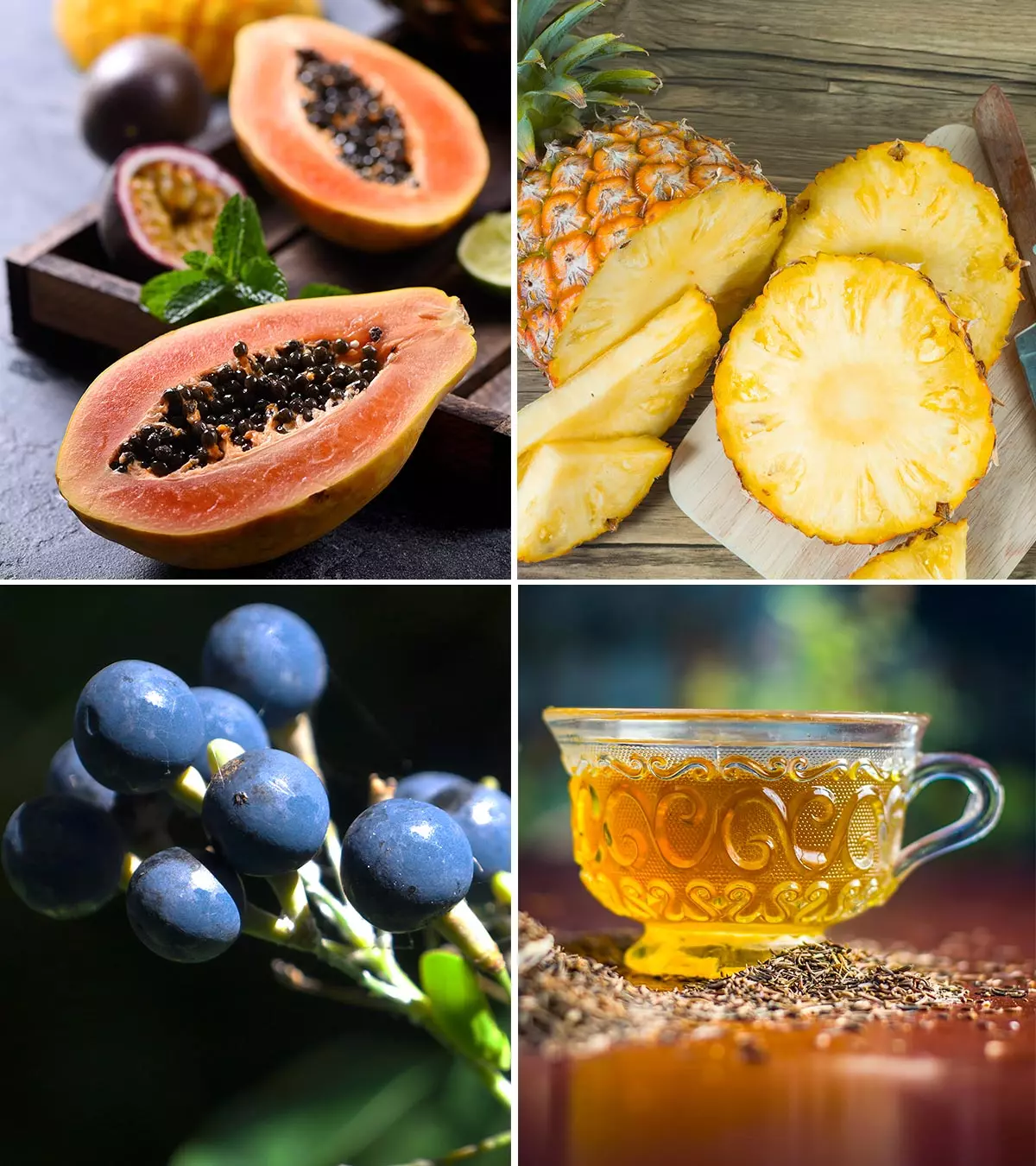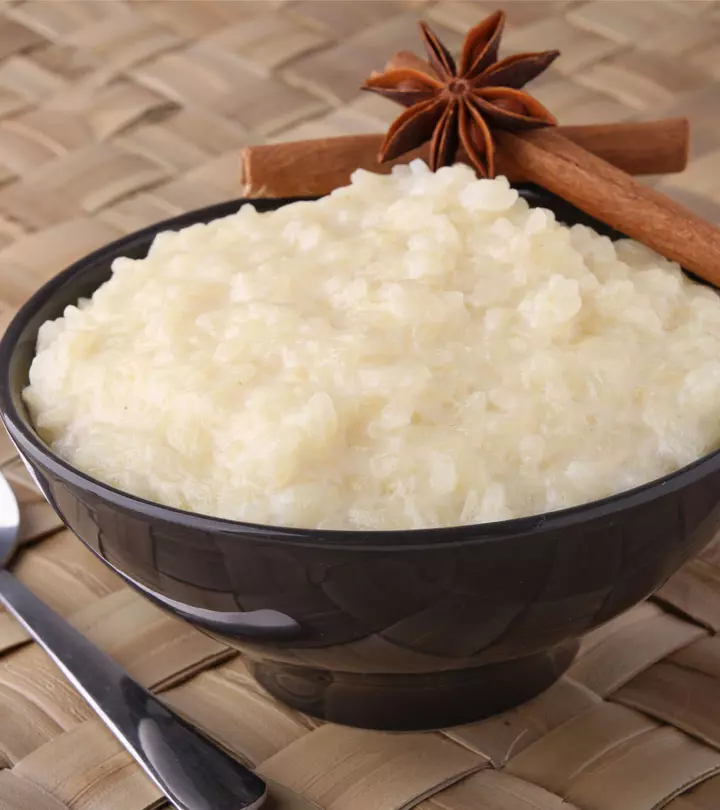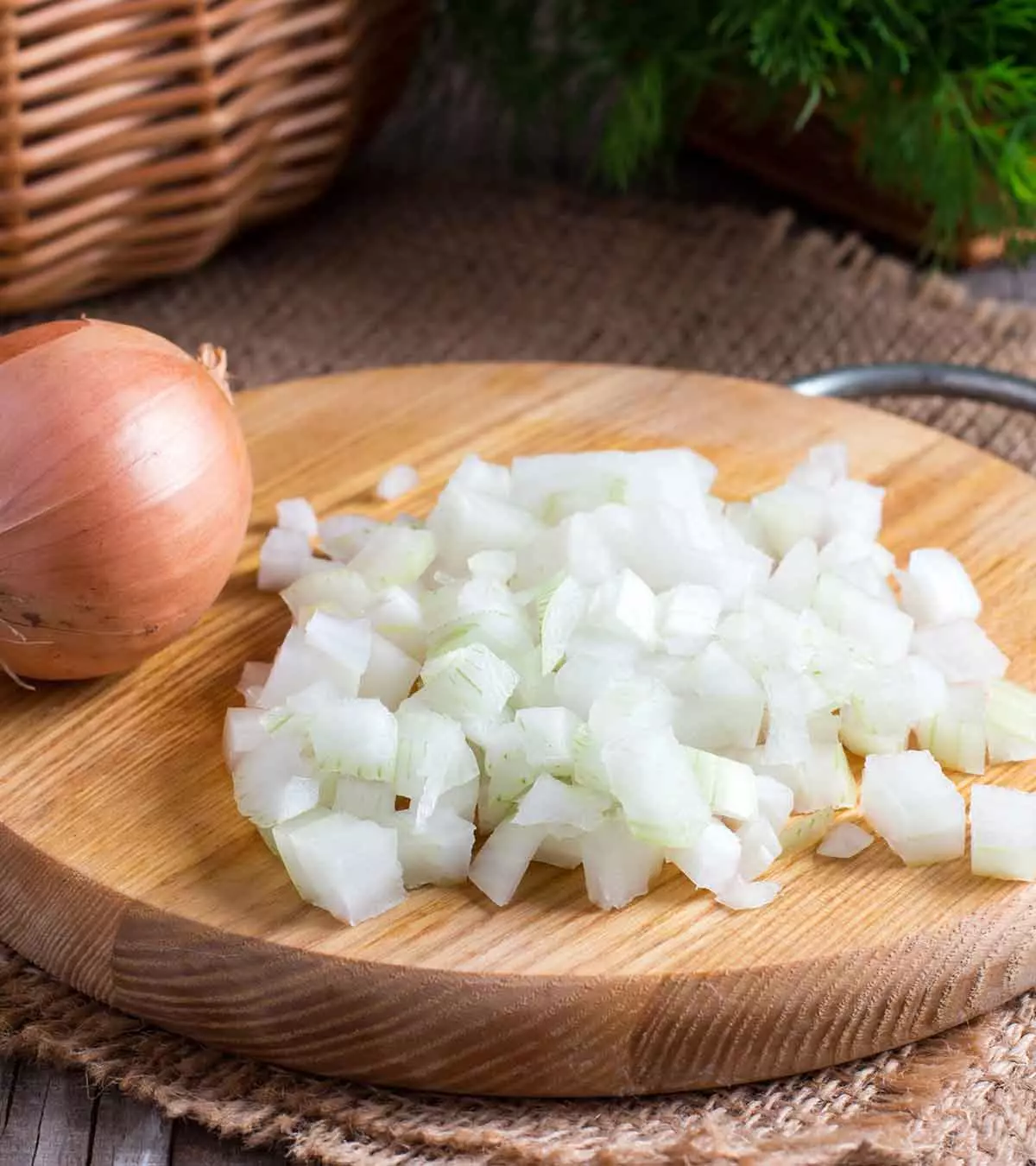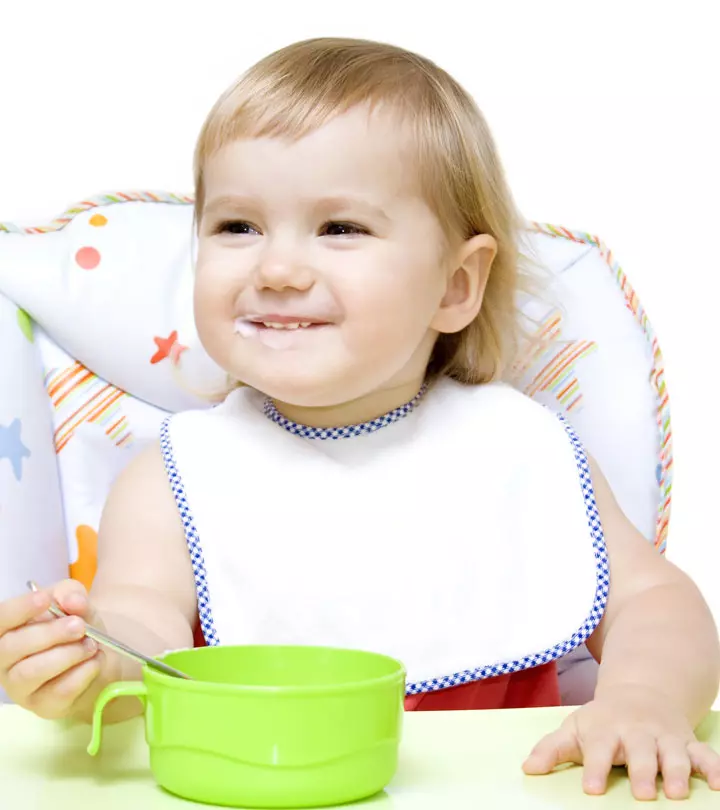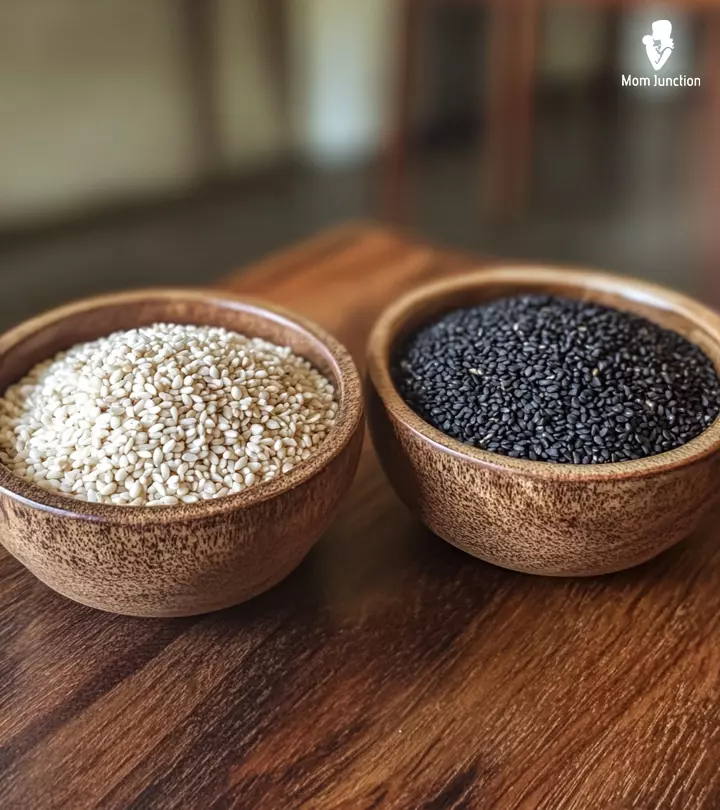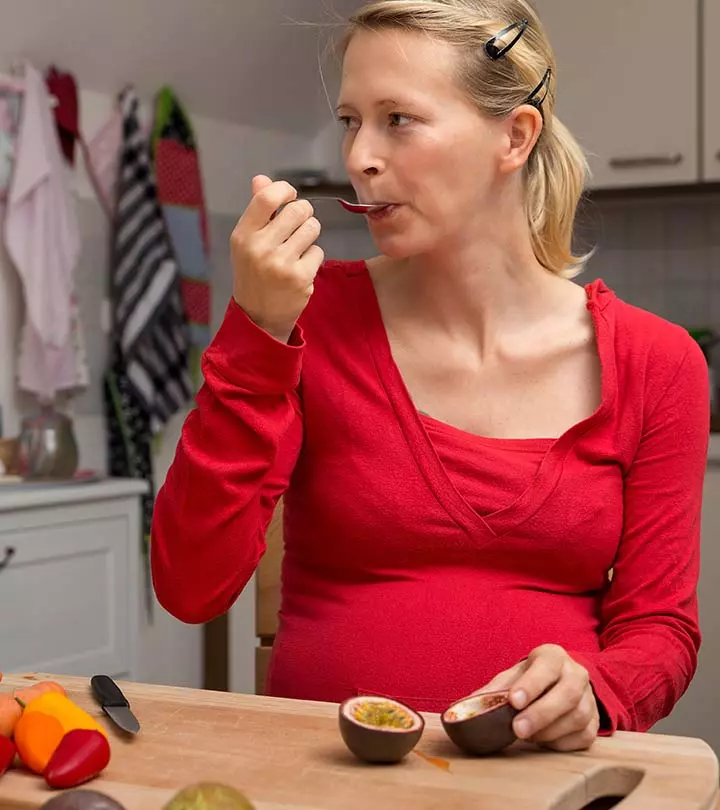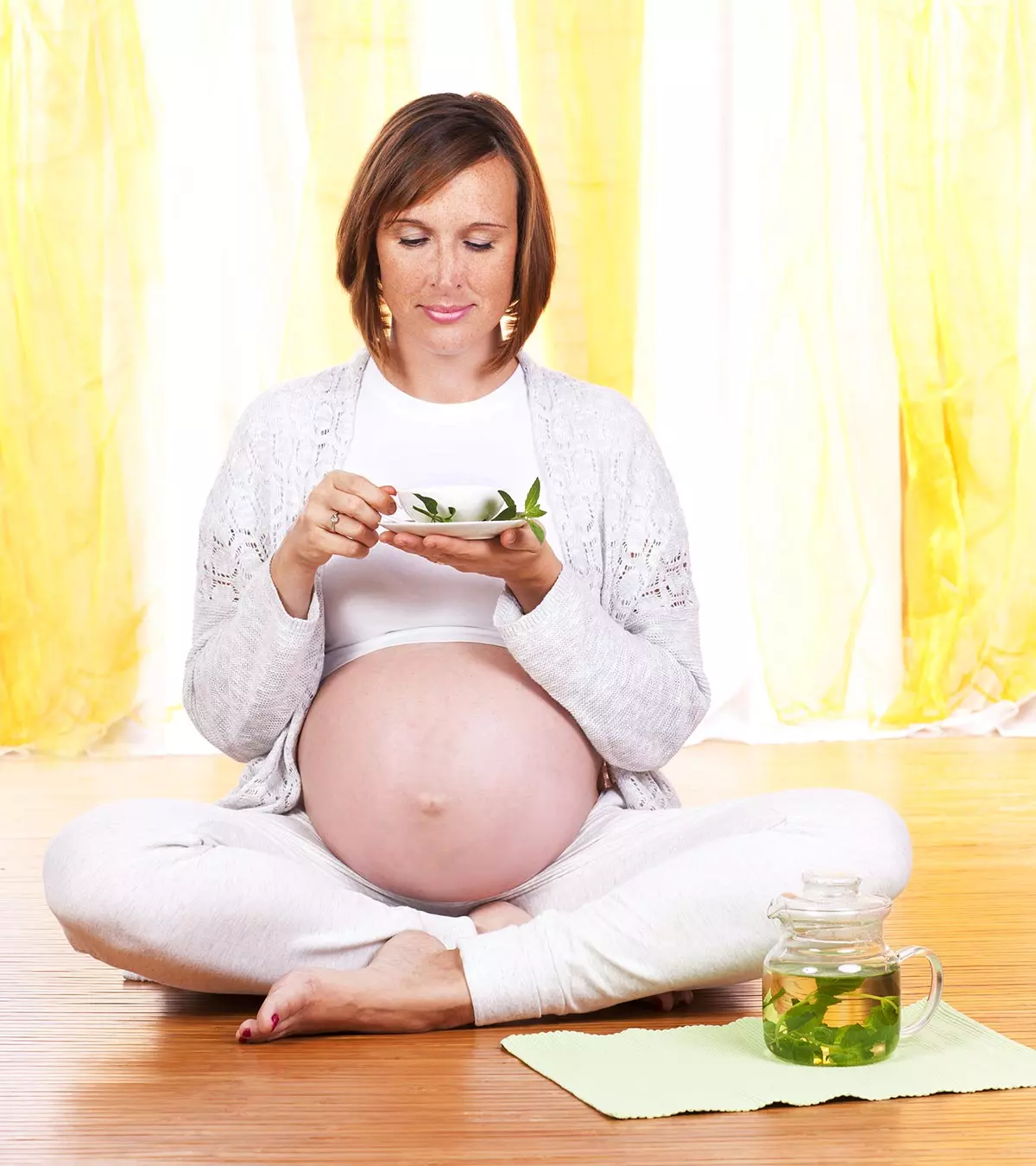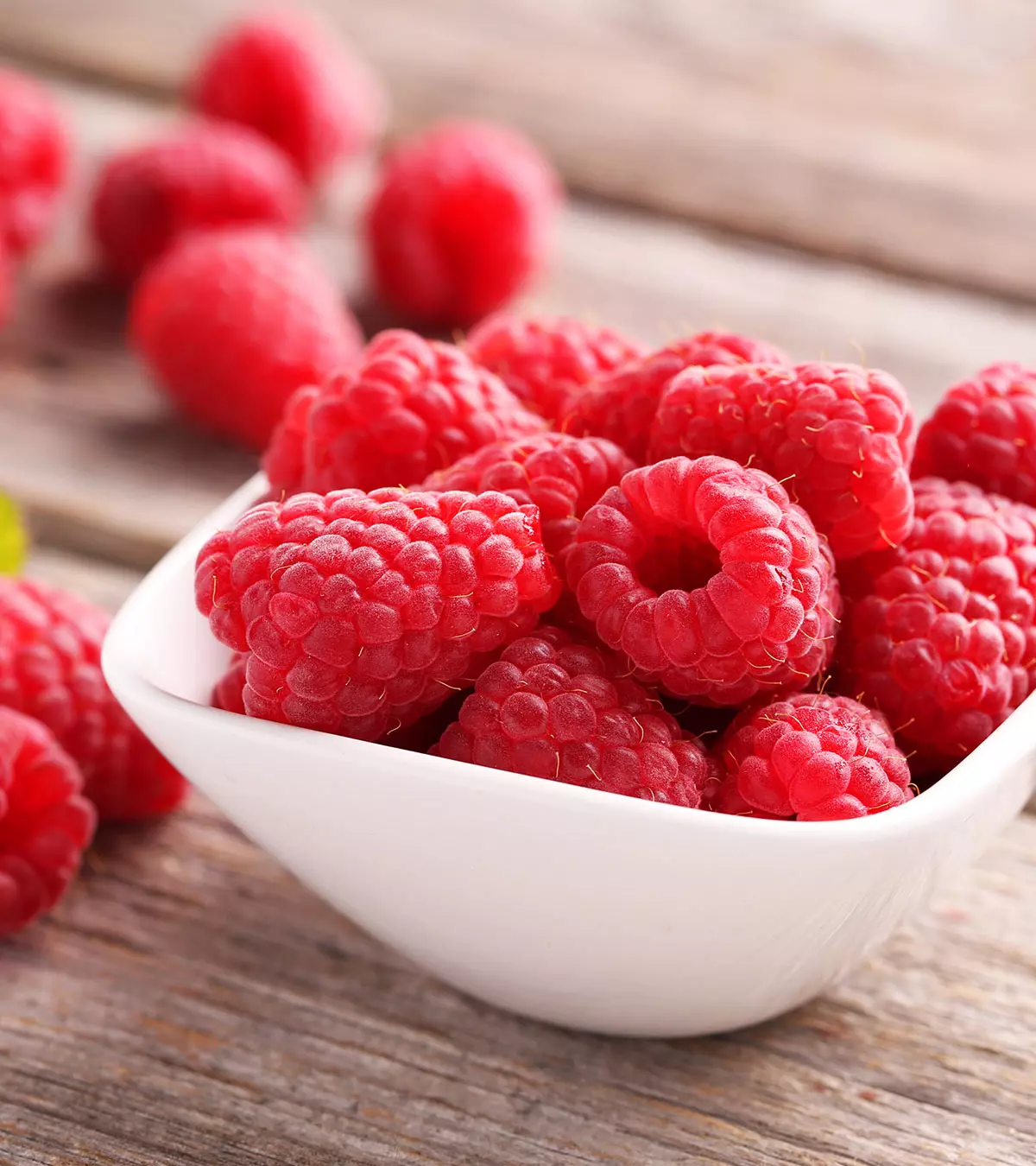
Image: Shutterstock

How safe is it to eat raspberries when pregnant? The juicy raspberries with rich sweet taste may make pregnant women crave to have a handful of them to satiate their sweet tooth. They are rich in vitamins(vitamin E, C, and vitamin K), minerals (calcium, iron, magnesium, phosphorus, potassium, zinc, copper, manganese, and selenium), phytochemicals, and antioxidants. Keep reading this post as we talk about the nutritional value, health benefits, and safety of eating raspberries during pregnancy.
Key Pointers
- Raspberries are a highly nutritious fruit that can support a healthy pregnancy.
- They are rich in vitamins and minerals, including vitamin C and iron.
- Raspberries have a high concentration of folate, which can help prevent birth defects.
- They aid in digestion, combat anemia, and boost immunity.
- The high antioxidant concentration in raspberries can help prevent infection and cancer.
- Fresh or frozen raspberries are safe to consume during pregnancy and can be added to smoothies, yogurt, or cereal.
What Are Raspberries?
A raspberry is an edible, delicious fruit, which is available in several colors. Raspberries have two distinct varieties: boysenberries and loganberries. Also, red raspberries are widely popular, and they are easily available in California. The berries enhance the taste of cakes and desserts. You may preserve the berries as jelly and jam. Raspberries are full of nutrients that help you enjoy a healthy pregnancy.
Nutritional Value Of Raspberries
According to the USDA, the following nutrients can be found in 100g of raspberries (8):
| NUTRIENT | AMOUNT |
|---|---|
| Water | 85.6g |
| Protein | 1.01g |
| Carbohydrate | 12.9g |
| Citric acid | 1740mg |
| Calcium | 16mg |
| Magnesium | 19.2mg |
| Phosphorus | 27mg |
| Potassium | 156mg |
| Vitamin C | 23mg |
| Biotin | 3.43µg |
Source: U.S. Department of Agriculture
Can You Eat Raspberries During Pregnancy?

Image: Shutterstock
Yes! You may enjoy eating raspberries while pregnant. In fact, raspberries are one of the best fruits to eat during pregnancy due to their high nutritional value. However, wash the berries thoroughly before consuming them. Unwashed fruit may contain harmful parasites and bacteria that may make you vulnerable to foodborne ailments such as listeriosisiA severe infection that may occur after consuming raw or unpasteurized foods contaminated by a bacteria called listeria. and toxoplasmosisiA parasitic infection one may contract by eating undercooked meat. . Wash each berry before eating it while expecting to get rid of parasites and pesticides.
 Quick tip
Quick tipHealth Benefits Of Eating Raspberries During Pregnancy
Raspberries not only enhance your delicacies but also offer you several health benefits to ensure a healthy pregnancy. Find below some common health benefits of raspberries during pregnancy.
1. Regulates Labor And Delivery:
Red raspberries are popular as uterine stimulator and relaxant.
The fruit regulates uterine contractions and facilitates labor and a safe delivery. Also, leaves of red raspberries help treat cramps, nausea, pain, dizziness, fatigue, and malaise during pregnancy. Drinking raspberry tea prevents hemorrhage and helps childbirth.
Leigh, a mother and a doula, shares her experience of going into labor after consuming raspberry tea. She says, “On Saturday evening I had some pretty strong, regular contractions – about 30s each every 5-7min, but they happened quite soon after a cup of red raspberry leaf tea and an unusually long toddler breastfeeding session (i).”
 Did you know?
Did you know?2. Prevents Birth Defects:
Raspberries contain a high amount of folate, so eating the fruit in pregnancy helps prevent the risks of birth defects in your unborn baby.
A good intake of folate through the berries protects your baby from neural tube defects, cardiovascular and limb defects, urinary tract anomalies, and pre-eclampsia, and ensures good prenatal care effectively.
3. Promotes Digestion:

Image: Shutterstock
Raspberries contain high amounts of dietary fiber and manganese which promote smooth digestion, prevent the risk of digestive disorders, maintain a high metabolic rate and prevent extra weight gain, and regulate your weight during pregnancy.
4. Boosts Immunity:
The high antioxidant content and phytonutrientsiA blanket term for a wide variety of compounds produced by the plants. in raspberries reinforce your immune system to a great extent benefiting maternal health.
Also, the fruit is full of minerals, vitamins, and other vital nutrients that help boost your immunity. So, eating raspberries in pregnancy helps prevent the development of harmful diseases and infections as well as safeguard the health your unborn baby.
5. Protects From Development Of Cancer:
Raspberries are a rich source of antioxidants and ellagic acid, a phytonutrient. The high antioxidant and phytonutrient content prevents the risk of cancer development while expecting.
6. Curbs Infections:
The flavonoids in raspberries break down into anthocyaninsiDeep red, blue, and purple pigments found in plants. that provide antioxidant and antimicrobial benefits. So, eating raspberries during pregnancy inhibits the growth of certain harmful bacteria and fungi in your body and prevents the risk of vaginal infections while expecting. Also, raspberries leaves treat skin rash effectively.
7. Cures Anemia:

Image: Shutterstock
According to the World Health Organization (WHO), anemia affects approximately 37% of pregnant women. Hence, consuming iron-rich foods during pregnancy is essential. Raspberries contain higher amounts of iron than other fruits. Therefore, including raspberries in your pregnancy diet can contribute to your iron needs and help prevent iron deficiency-related issues, such as anemia, fatigue, and dizziness.
8. Treats Respiratory Problems:
Eating red raspberries during pregnancy helps treat respiratory problems such as a cough, sore throat, flu, and common cold effectively.
Frequently Asked Questions
1. Do raspberries cause miscarriage?
There is no scientific evidence to prove that raspberries may cause miscarriage. On the contrary, raspberry leaf products are often used during pregnancy to prevent birth-related complications (1).
2. Can I eat frozen raspberries while pregnant?
Yes, you may consume all kinds of fresh fruits, dried or frozen, while pregnant, including raspberries (you may include them in smoothies too). Moreover, since raspberries are seasonal and may not be available around the year, you may consume them frozen. However, make sure to avoid packed ones with too many sugars and choose well-frozen packages (without ice) and store them away from other foods such as raw meat and fish (2) (3).
3. When should I start drinking raspberry leaf tea to soften my cervix?
Although raspberries are believed to ease the birth process, there is a lack of sufficient research to prove their effectiveness and the right time to consume them among pregnant women (4).
4. What are the side effects of raspberries?
The potential side effects of raspberry have not been extensively studied among pregnant women. Nevertheless, among the commonly reported ones include its ability to pose the risk of allergic symptoms in pregnant women, including hives, breathing difficulties, and facial, lips, tongue, or throat swelling. In addition, raspberries are generally not recommended for consumption in people with a history of uterine fibroids, endometriosis, and cancers (of the ovaries, breast, and uterus) (5). Furthermore, a case study reported that excessive consumption of raspberry leaf tea during pregnancy may disturb fetal heart rhythm. Therefore, pregnant women need to check safe quantities before consuming raspberries or raspberry leaf tea (6).
Infographic: How To Savor The Taste Of Raspberries During Pregnancy?
Enriched with vitamin C, manganese, and other essential nutrients, raspberries can be a nutritious addition to a pregnancy diet as long as they are eaten in moderation. So, look through the infographic below to explore delicious ways you can savor the taste of raspberries when pregnant.
Some thing wrong with infographic shortcode. please verify shortcode syntax
Illustration: Raspberries During Pregnancy: Are They Safe To Eat?

Image: Stable Diffusion/MomJunction Design Team
Do you prefer to have a cup of fresh raspberry tea every day? Learn about the benefits of red raspberry leaf tea and discover how it can help you during pregnancy.
Personal Experience: Source
MomJunction articles include first-hand experiences to provide you with better insights through real-life narratives. Here are the sources of personal accounts referenced in this article.
i. My experience of prodromal labour;https://diaryofadurbandoula.blogspot.com/2018/05/my-experience-of-prodromal-labour.html
References
- M Parsons et al., (1999); Raspberry leaf and its effect on labour: safety and efficacy.
https://pubmed.ncbi.nlm.nih.gov/10754818/ - 3 Power Foods That Will Change The Way You Eat During Pregnancy.
https://sustainablefoodcenter.org/3-fall-foods-to-nourish-you-and-your-baby/ - MyPlate—The Fruit Group: Focus on Fruits.
https://pubs.nmsu.edu/_e/E141/index.html - Lone Holst et al., (2009); Raspberry leaf – Should it be recommended to pregnant women?
https://www.sciencedirect.com/science/article/abs/pii/S1744388109000589/ - Raspberry.
https://wa.kaiserpermanente.org/kbase/topic.jhtml?docId=d04526a1&secId=d04526a1-Header - Stupak A et al., Raspberry leaf infusion caused a fetal heart arrhythmia.
https://fetalmedicine.org/abstracts/2025/var/pdf/abstracts/2025/04132.pdf - Rebekah Bowman et al.; Biophysical effects safety and efficacy of raspberry leaf use in pregnancy: a systematic integrative review.
https://bmccomplementmedtherapies.biomedcentral.com/articles/10.1186/s12906-021-03230-4 - Raspberries, raw.
https://fdc.nal.usda.gov/food-details/2346410/nutrients
Community Experiences
Join the conversation and become a part of our nurturing community! Share your stories, experiences, and insights to connect with fellow parents.
Read full bio of Moloko Mehlape
Read full bio of Ria Saha
Read full bio of Swati Patwal
Read full bio of Lorraine Teron










